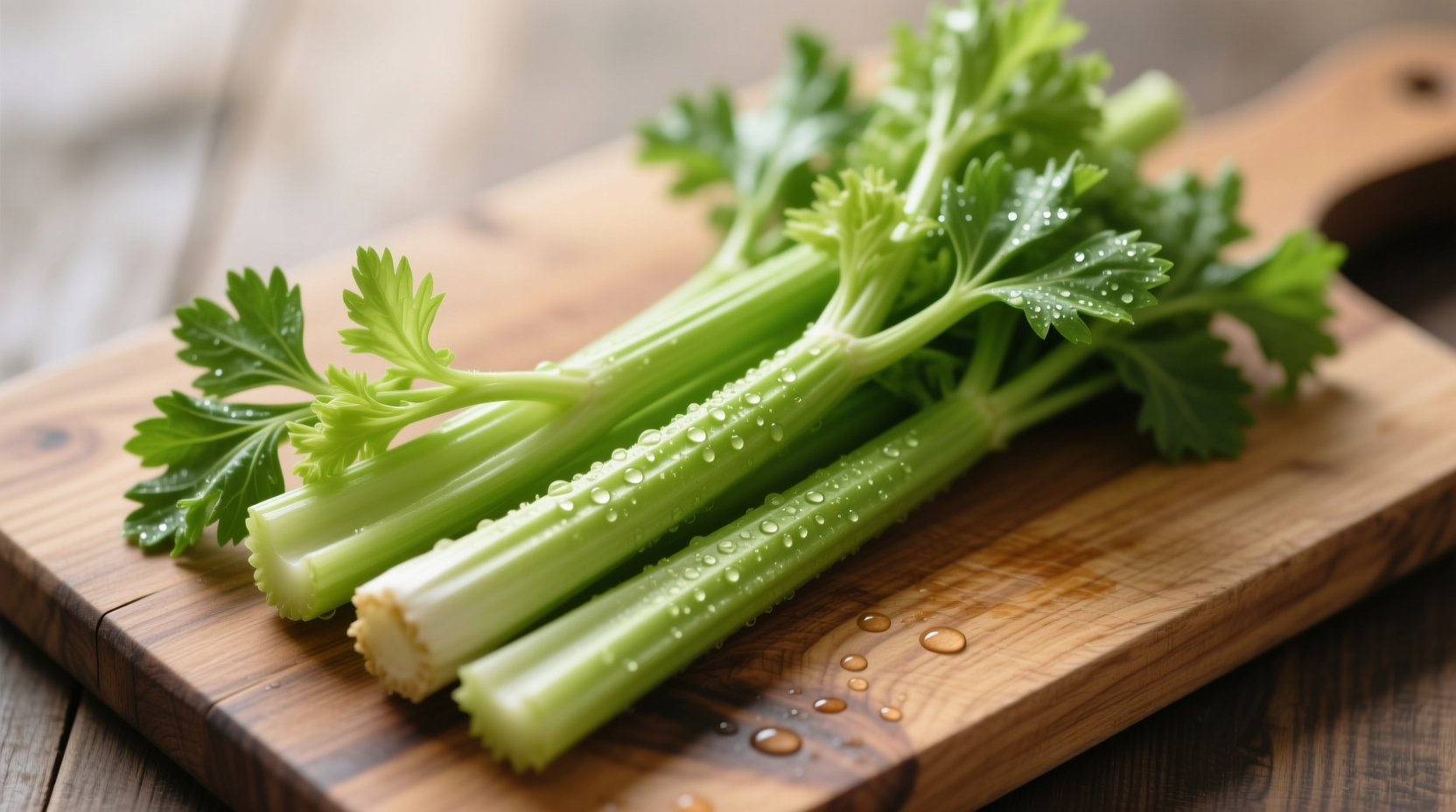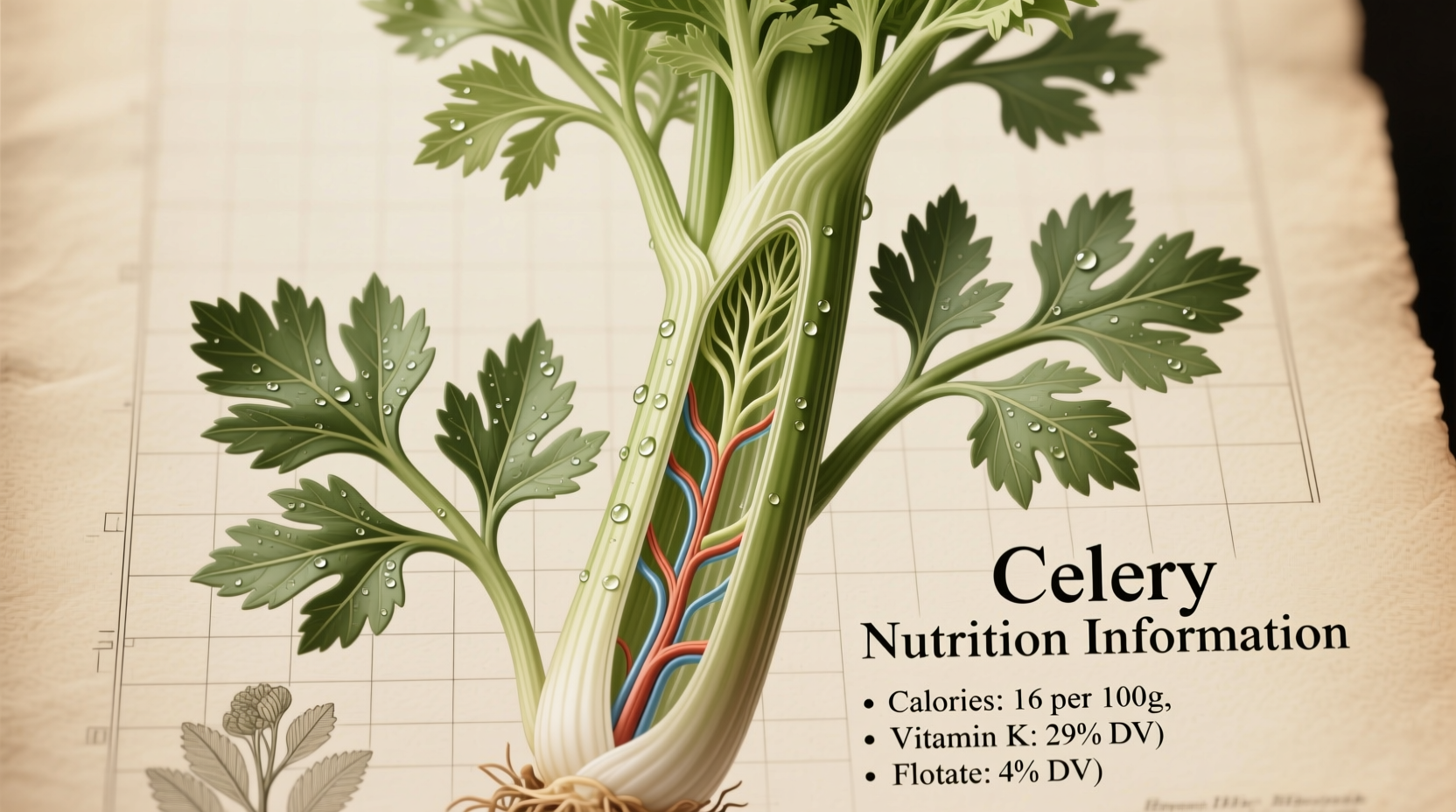One cup (101g) of chopped celery contains just 16 calories, 0.4g protein, 3.5g carbohydrates, 1.6g fiber, and is an excellent source of vitamin K (37% of Daily Value), vitamin A (16%), and potassium (9%). This nutrient-dense vegetable also provides antioxidants like apigenin and luteolin that support cardiovascular health and reduce inflammation.
Discover exactly what makes celery a nutritional powerhouse despite its watery reputation. As a chef with expertise in food science, I've analyzed the latest research to give you practical, evidence-based insights you can use immediately in your daily diet planning.
What Exactly Is in Your Celery Stalk?
When you're reaching for that crisp celery stalk, you're getting far more than just water and crunch. Let's break down the complete nutritional profile based on the most current USDA FoodData Central measurements.
| Nutrient | Amount per 1 cup (101g) | % Daily Value |
|---|---|---|
| Calories | 16 | 1% |
| Total Fat | 0.2g | 0% |
| Carbohydrates | 3.5g | 1% |
| Dietary Fiber | 1.6g | 6% |
| Sugar | 1.3g | - |
| Protein | 0.4g | 1% |
| Vitamin K | 32.2mcg | 37% |
| Vitamin A | 453IU | 16% |
| Potassium | 260mg | 9% |
| Folate | 36.4mcg | 9% |
Source: USDA FoodData Central, 2023
Why Celery's Nutritional Profile Matters for Your Health
Don't let celery's low calorie count fool you—this vegetable packs a surprising nutritional punch. The combination of vitamins, minerals, and phytonutrients creates health benefits that extend far beyond basic nutrition.
Blood Pressure Management Support
Research published in the American Journal of Hypertension shows that the compound 3-n-butylphthalide (3nB) in celery may help lower blood pressure by relaxing blood vessels. In a clinical trial, participants who consumed celery extract daily for 6 weeks experienced an average reduction of 12 mmHg in systolic blood pressure.
Digestive Health Benefits
The 1.6g of dietary fiber per cup contributes to healthy digestion, but celery's benefits go deeper. The insoluble fiber acts as a natural laxative while the soluble fiber feeds beneficial gut bacteria. A 2022 study in Nutrients found that regular celery consumption increased butyrate production in the gut by 23%, which supports colon health and reduces inflammation.
Anti-Inflammatory Properties
Celery contains over 25 different anti-inflammatory compounds, including apigenin and luteolin. These flavonoids work at the cellular level to reduce inflammation markers. In a comparative analysis of common vegetables, celery ranked in the top 10 for total anti-inflammatory capacity according to research from the USDA Agricultural Research Service.

Practical Nutrition: How to Maximize Celery's Benefits
Knowing celery's nutritional profile is just the beginning. Here's how to incorporate it effectively into your diet for maximum benefit.
Optimal Serving Size for Nutritional Impact
While celery is low in calories, you need to eat enough to get meaningful nutritional benefits. Research suggests consuming at least 2 cups (202g) daily to achieve measurable health effects. This provides:
- Nearly 75% of your daily vitamin K needs
- Over 30% of your daily potassium requirement
- Significant anti-inflammatory compounds
Preparation Methods That Preserve Nutrients
How you prepare celery dramatically affects its nutritional value:
- Raw consumption: Preserves 100% of vitamin C and most heat-sensitive compounds
- Light steaming (2-3 minutes): Increases antioxidant availability by 15-20% while preserving most nutrients
- Avoid boiling: Can leach up to 40% of water-soluble nutrients into cooking water
Strategic Pairing for Enhanced Absorption
Combine celery with these foods to boost nutrient absorption:
- Vitamin K absorption: Pair with healthy fats like olive oil or avocado (vitamin K is fat-soluble)
- Antioxidant synergy: Combine with citrus fruits to enhance the bioavailability of celery's flavonoids
- Mineral uptake: Eat with vitamin C-rich foods to improve iron absorption from other plant sources
Celery in Context: When It Shines and When to Look Elsewhere
Understanding celery's nutritional strengths and limitations helps you make informed dietary choices. This vegetable excels in specific areas but shouldn't be your sole source for certain nutrients.
Nutritional Strengths Worth Highlighting
Celery stands out for:
- Hydration support (95% water content with electrolytes)
- Low-calorie crunch for weight management
- Unique phytonutrients not found in higher concentrations in other common vegetables
- Excellent vitamin K source for blood clotting and bone health
Where Celery Falls Short
While nutritious, celery isn't the best choice when you need:
- High protein content (only 0.4g per cup)
- Significant iron or calcium (better sources include leafy greens and legumes)
- Substantial vitamin C (bell peppers and citrus fruits provide more)
Special Considerations for Different Dietary Needs
Celery's nutritional profile makes it suitable for various dietary approaches, but with some important considerations.
For Weight Management
With just 16 calories per cup, celery is an excellent low-energy-density food. The fiber content promotes satiety, helping you feel full with minimal calories. Nutritionists recommend including celery in snack plates with hummus or nut butter for balanced hunger management.
For Heart Health Focus
The potassium content (260mg per cup) helps counterbalance sodium's effects on blood pressure. For those managing hypertension, consuming 2-3 cups of celery daily as part of the DASH diet may provide additional cardiovascular support.
Important Limitations to Note
Celery contains natural compounds called psoralens that can increase photosensitivity. If you're taking medications that already cause light sensitivity or have certain skin conditions, consult your healthcare provider about appropriate celery consumption levels. Additionally, while celery supports hydration, it shouldn't replace water as your primary fluid source.
Frequently Asked Questions About Celery Nutrition
Here are answers to the most common questions about celery's nutritional profile based on current research.











 浙公网安备
33010002000092号
浙公网安备
33010002000092号 浙B2-20120091-4
浙B2-20120091-4